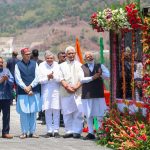Amid tensions between Beijing and Tokyo over the Diaoyu/Senkaku islands and New Delhi’s impasse with Beijing over the incursion incident, India, the US and Japan held their fourth trilateral dialogue to expand the compass of their cooperation in the Indo-Pacific region, an emerging zone of competition and rivalry.
Senior officials of the three democracies discussed a wide gamut of regional and international issues in Washington May 1 and mapped news ways to add more strategic and economic heft to their trilateral cooperation. “These discussions focused on the prospect of greater Indo-Pacific commercial connectivity and regional and maritime security, and cooperation in multilateral fora,” the State Department said in a statement in Washington DC May 1. “All sides welcomed the frank and comprehensive nature of the discussions and agreed the talks help advance shared values and interests,” it said.
Although there was no official word on whether China’s foreign policy postures and their implications for regional stability figured in the discussions, informed sources disclosed that China was on the table as part of the larger discussion on the regional situation. China has warily watched the progress of the US-Japan-India trilateral and suspects the trilateral as part of the larger US strategy to contain the rise of Beijing.
The trilateral dialogue took place at a time when both India and Japan are encountering calculated Chinese assertiveness on territorial sovereignty issues. In India’s case, the incursion by Chinese troops across the Line of Actual Control in the western sector over two weeks ago has threatened to imperil bilateral ties. China has denied any incursion, but has indicated it’s ready for a mid-way solution in the interest of the larger India-China relationship. If the incursion issue is not resolved amicably, it could adversely impact the forthcoming visit of Chinese Premier Li Keqiang to New Delhi, likely May 20.
With Japan, it’s a different story. Competing claims over the disputed islands (which Japan calls Senkaku and China calls Diaoyu islands) have the potential to derail bilateral ties, with the issue arousing nationalistic sentiments in both countries.
In a move fraught with serious implications for the delicate balance of power in Asia, the new Chinese leadership has taken an assertive stance on what it calls core sovereignty issues – put simply, it means Beijing could wage a war to protect territories it regards as part of the People’s Republic of China. It seems Senkaku/Diaoyu Islands, which is claimed with equal fervor by both Japan and China, have been added to the list of Beijing’s core sovereignty areas. Three years ago, the Chinese leadership added South China Sea to its core sovereignty interests that also includes Taiwan and Tibet. Striking a tough posture, China’s ambassador to the US has warned the US not “to lift the rock off Japan only to let it drop on its own feet.”
Author Profile
- India Writes Network (www.indiawrites.org) is an emerging think tank and a media-publishing company focused on international affairs & the India Story. Centre for Global India Insights is the research arm of India Writes Network. To subscribe to India and the World, write to editor@indiawrites.org. A venture of TGII Media Private Limited, a leading media, publishing and consultancy company, IWN has carved a niche for balanced and exhaustive reporting and analysis of international affairs. Eminent personalities, politicians, diplomats, authors, strategy gurus and news-makers have contributed to India Writes Network, as also “India and the World,” a magazine focused on global affairs.
Latest entries
 DiplomacyOctober 4, 2025UNGA Resolution 2758 Must Not Be Distorted, One-China Principle Brooks No Challenge
DiplomacyOctober 4, 2025UNGA Resolution 2758 Must Not Be Distorted, One-China Principle Brooks No Challenge India and the WorldJuly 26, 2025MPs, diplomats laud Operation Sindoor, call for national unity to combat Pakistan-sponsored terror
India and the WorldJuly 26, 2025MPs, diplomats laud Operation Sindoor, call for national unity to combat Pakistan-sponsored terror India and the WorldJuly 25, 2025When Fire Ends, Diplomacy Begins
India and the WorldJuly 25, 2025When Fire Ends, Diplomacy Begins India and the WorldJuly 16, 2025Operation Sindoor and its Aftermath: India’s Successful Diplomatic Outreach
India and the WorldJuly 16, 2025Operation Sindoor and its Aftermath: India’s Successful Diplomatic Outreach







